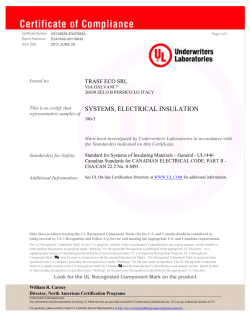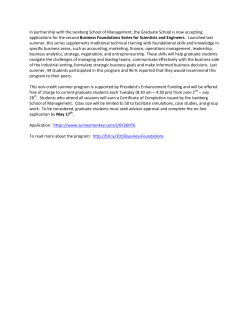
Brochure PDF - Osgoode Professional Development
Osgoode’s DESIGNED FOR INTERNATIONALLY TRAINED LAWYERS AND LAW GRADUATES pre-llm foundations program DIRECTOR Shelley Kierstead Assistant Professor Osgoode Hall Law School www.osgoodepd.ca A WORLD LEADER IN LAW SCHOOL LIFELONG LEARNING Message from the Program Director Professor Shelley Kierstead, LLB, LLM, PhD I am excited to be the Director of Osgoode’s new Pre-LLM Foundations Program. Having taught legal research and writing to international LLM students for a number of years, I understand the difficulties that some students face when beginning their LLM studies in Canada. Legal studies in Canada can be very different from legal studies back home, and this program provides an ideal transitional period for you to develop the language, analytical and writing tools you need to succeed. With tutoring, small-group work, and one-on-one feedback, you have the ability to learn from past mistakes and perfect your skills prior to the start of your LLM. Learn, meet friends, and lay the foundation for future success. I look forward to welcoming you to the program. If you are an internationally trained lawyer looking to pursue graduate studies in law, prepare with Osgoode’s new Pre-LLM Foundations Program. This program is also ideal for prospective NCA candidates looking to improve their language and writing skills before embarking on the accreditation process. Our 9-month program runs annually from September to May and is divided into two parts. Part 1 is a four-month pre-LLM language program at York University’s English Language Institute and Part 2 is a five-month foundational program for graduate legal studies at Osgoode. While most students will take both parts, those with strong language skills are welcome to apply for Part 2 only. Part 1: YUELI’s Pre-LLM Language Program (September to December) YUELI’s pre-LLM language program is designed to provide you with the legal terminology, language and writing skills you need to succeed in our LLM programs. Through the first part of this program, you will: • Improve on your 6.5 or 7.0 IELTS or equivalent language score and study the language of the law in a small group, law-focused environment; • Perfect grammar and structure in your writing; • Work with legal terminology and documents; and • Practise your professional speaking and presentation skills. Part 2: Foundations for Graduate Legal Studies (January to May) Whether you are a civil trained lawyer or a common law trained lawyer from another jurisdiction, this program will help you develop the legal, analytical and writing skills required for successful performance in your LLM and subsequent legal career. . Through the second part of this program, you will: • Learn the format, content and expectations of law school study in Canada; • Study the foundations of Canadian public and private law in a small group setting; and • Learn and practise legal, analytical and writing skills by building from simple to more complex problems and documents, with opportunity for small group and individual feedback and tutoring. Part 2: Foundations for Graduate Legal Studies - Courses and Course Descriptions Orientation to Law This two-week intensive introduction to law school study in Canada introduces students to basic common law concepts. It teaches students essential skills such as learning by the Socratic Method, taking lecture notes, reading cases and legislation and preparing case summaries. There will be regular homework consisting of smaller exercises as well as some larger written assignments. Introduction to Graduate Legal Analysis and Writing This course will focus on the development of graduate-level skills in legal analysis and writing. The materials, classes and evaluation methods are designed to assist students: (1) in acquiring the tools required to perform sound legal writing; (2) to develop ways to analyze common-law legal problems; and (3) to use provided frameworks to create a range of commonly used legal documents and assignments in the LLM program and beyond, including legal memoranda, legislative and case commentaries, and graduate level research papers. Introduction to Canadian Law In this course, students will gain a broad understanding of how the law operates in a Canadian context and the conceptual foundation to pursue more detailed studies in Canadian law. It focuses primarily on Canada’s legal structure and Constitution. Among other topics, it covers legal tradition, legal theory, sources of law, relationship of various categories of law and the branches of government, court hierarchy, case and statute interpretation and administrative decision making. Introduction to Private Law in Canada Students will examine the fundamentals of Canadian tort, contract and property law in common law provinces. Additionally, this course will also provide students with a foundation in Canadian corporate and commercial law. Osgoode Osgoode Hall Law School, founded in 1889, has led the most important developments in Canadian legal education for over a century. Our mission is to contribute to new knowledge about the law and the legal system by being a centre for thoughtful and creative legal scholarship, to provide an outstanding professional and liberal education to our students so that they can assume positions of leadership in the legal profession, among legal academics and in all aspects of public life, and to serve Canadian society and the world in ways that further social justice. OSGOODE HALL LAW SCHOOL CONSISTENTLY RANKS AMONG THE TOP 3 CANADIAN LAW SCHOOLS Visit www.osgoode.yorku.ca for more information. Toronto In 2015, a study by the Economist Intelligence Unit ranked Toronto as the best city to live in - in the world! That’s something to be proud of. The capital of Ontario, Toronto is the country’s financial and business capital. Its 2.79 million population makes it the fourth largest city in North America, and is ranked as the safest large metropolitan area in North America by Places Rated Almanac. Torontonians are well-known for their inclusiveness, tolerance and diversity. Toronto hosts international audiences at a wide variety of arts and sporting events in world class facilities, including the upcoming 2015 Pam Am/Parapan Am Games. » ELIGIBILITY REQUIREMENTS Parts 1 and 2 combined: You can attend if you are an internationally trained lawyer or law graduate with an English proficiency score of 6.5 IELTS or higher (or equivalent). For language test score equivalencies, visit York’s webpage at http://futurestudents.yorku.ca/requirements/language_tests. Part 2 on its own: You can attend if you are an internationally trained lawyer or law graduate with an English proficiency score of 7.0 IELTS or higher (or equivalent). Note that while we do accept applicants with 7.0 IELTS scores directly into Part 2, if you have a 7.0 IELTS or equivalent, we recommend that you consider taking Part 1 to boost your language skills before Part 2. » TO APPLY Please visit our website at osgoodepd.ca and view options for International Lawyers and Law Graduates, or contact our Admissions Office at 416.673.4670. If you are from China, please contact Tony Y. Zeng, York University’s Official Representative in China at 86-10-58698047, or by email at appl@yorku.org.cn The application deadline for Part 1 and 2 combined is June 15, 2015. The application deadline for Part 2 on its own is October 15, 2015. There is an application fee of $50. Note that this fee will be waived for applicants who have applied for another of our LLM programs but choose to take the Foundations program instead. » TUITION AND FEES The fees for the Pre-LLM Foundations Program for 2015/2016 are Part 1: $8,000 CDN and Part 2: $12,000 CDN plus material fees and applicable taxes. Fees are due in full prior to enrollment in classes. Fees are subject to change without notice. FOR MORE INFORMATION admissions-opd@osgoode.yorku.ca 416.673.4670 or toll free within Canada at 1.888.923.3394 » APPLY NOW! ENROLLMENT IS LIMITED. 1 Dundas Street West | Suite 2600, Toronto, ON Canada M5G 1Z3 | tel: 416.597.9724 / 1.888.923.3394 | www.osgoodepd.ca © Osgoode Professional Development, 2015
© Copyright 2025









